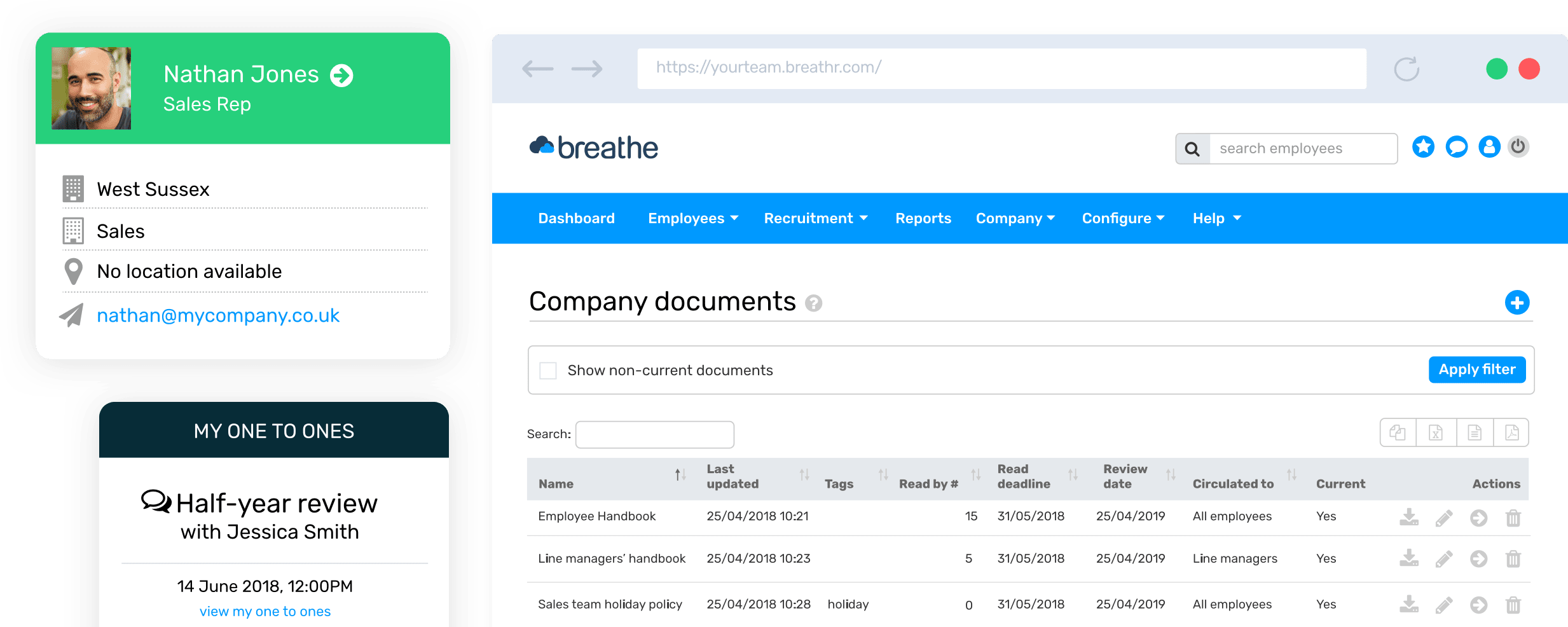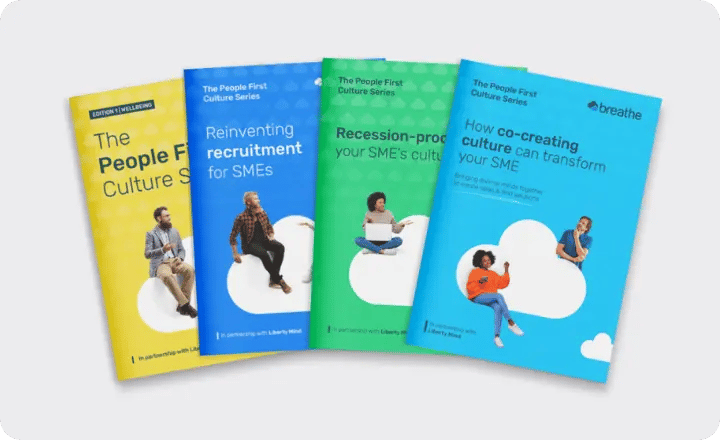Let’s work together – and make things better
Take a free trial of Breathe to see for yourself how easy it is to win back time in your day and help your people be the best they can be.

We've built a culture at Breathe around three values that define who we are and guide how we behave.
These values help us take difficult decisions and guide the way we interact with our colleagues, customers and suppliers.


1
People First
In every decision we consider who will be impacted and what that impact will be. We are the people first company.
2
Strive for impact
We make a difference. With every action we maximise our impact on our customers and on our business.
3
Seek out efficiency
We relentlessly seek out ways to efficiently grow, scale & accelerate our business without waste.
4
Be better tomorrow
At the individual, team and company level we demand of ourselves every day to know more, learn more, and be more.
Ask any business leader for a definition of what company culture is and they’ll all give you a different answer.
It’s not just the values plastered on the walls, nor is it the office fruit bowls, bean bags or table-tennis tables.
It isn’t even the leadership style. Company culture is all the above and more. It's how a company cultivates business growth by offering each employee a voice, while encouraging healthy day-to-day attitudes, behaviours and work ethics.
Some say company culture refers to the mission statement of a business, along with the values and beliefs upheld by its founders.
Others refer to company culture as a collective force made up from employees, interactions and the environment in which they work. Many refer to company culture as the DNA, the soul or the personality of the business.
We know that good company culture involves trust, respect, and the opportunity for employees to participate in shared values and love what they do.
It’s something that develops organically from the top down. It isn’t something a business can buy in, though there are many means that can help, such as systems and consultants. In our opinion, company culture is like an ecosystem that needs to be nurtured in order to thrive.
Great company culture sets the foundations for real, tangible business growth. It’s based on honest, productive conversations and helps companies to identify issues and collectively form resolutions.

Join hundreds of SMEs who’ve pledged to put their people first. Discover the business-benefits of committing to your culture today.

Get the latest insights on SME company culture and uncover actionable advice to help your people and business thrive in 2023 & beyond.

With useful information and advice to help your company culture flourish, check out the Breathe blog to read the latest insights from our experts.

19 February, 2024 by Aimée Brougham-Chandler

13 February, 2024 by Aimée Brougham-Chandler
SMEs are at an advantage here. With less large corporate hierarchical systems and more startups emerging each year, internet-led entrepreneurism encourages SMEs to work on their business from the inside out.
Gifted with more opportunities for face-to-face communication and flexible working conditions, SMEs can respond quickly and adapt their company culture to gain a happy work-life balance for its employees from the start.
On the flip-side, ignoring the needs of your employees and adopting what is known as a ‘toxic company culture’ heralds disastrous results for overall business performance.
In a nutshell, cultivating a great company culture is important not only for employee engagement, happiness and retention, but also, plotting the blueprints for a thriving business; regardless of the economic climate.
Gaining significance and speed over the last decade, company culture encourages CEOs, HR consultants and company leaders to ask the right questions that lead to honest evaluation and pushes for change.
After all, it is only when we identify and establish what could be changed that we can then set about resolving issues and conflicts to progress and grow above our own limitations and, indeed, business competitors.
It’s no lie that reputation is everything. In a time where online publishing, blogging and company trolling is prolific, media scandals and recent headlines have given voice to large and small business malpractice.
Thanks to the necessary exposure of misplaced company and employee welfare practices (such as BBC gender pay gap & Uber), HR consultants are urged to push past the ‘fluff’ and address what really matters; their people.
On the other side of the water cooler, we are now seeing the positive impact that company culture reviews have on not just individual employees but businesses as a whole. (Kudos to Uber and Netflix for learning from their mistakes.)
.webp?width=599&name=small%20business%20culture%20breathe%20(1).webp)
Employee and economic health are important measures of company culture.
Great company culture theories, such as the HBR Framework and Schein Culture Model clearly demonstrate that companies who measure profit and monetary incentives higher than human empathy and employee understanding are more likely to damage business performance.
Findings from the culture economy report go further still; showing direct links between corrupt company cultures, employee satisfaction and tenure.
Such fractured working communities not only jeopardise an employee’s mental and physical health but can also lead to an adverse effect on our society and UK economy.
Great company culture positively impacts business growth, longevity and results.
Contrary to what some HR specialists are led to believe, studies demonstrate that the most profitable companies are not actually the most profit-focused. Through switching their target from profit to purpose, employees and employers alike gain greater role-fulfillment, which in turn increases productivity, efficiency and quality results. And what does quality lead to? Profit of course.
So, by ensuring that all employees understand their company’s culture, objectives and targets, all team members can start on the right page.
Setting the stage for success, when a company begins with solid foundations, their employee engagement, staff retention, business longevity and growth targets are more likely to sync, leading to results the whole company can be proud of.
In our recent research on The Culture Economy we asked 500 SME senior decision makers in the UK if they believed workplace culture impacts positively on company performance. Of the 500 participants, 72 per cent believed company culture does have a positive impact on business performance; 9 per cent reported that company culture had no effect on performance and 19 per cent said they didn’t know.
Interestingly the percentage figures change as the company gets bigger. In small businesses with between 10 and 49 employees, 77 per cent agreed that culture has a positive effect on performance within the business; while 10 per cent disagreed and 13 per cent didn’t know.
For correspondents in medium sized businesses (50-249 employees), 88 per cent believed company culture has a positive effect on business outcomes, while only 7 per cent disagreed, and 6 per cent said they didn’t know.
Medium-size businesses seem to understand better than small businesses that even the best strategic plans can fall short without the right people in the right roles, and they seem more committed to the idea of improving employee engagement. That is not to say there aren’t many small businesses out there getting company culture right.
The difficulties in maintaining culture seem to hit small businesses at around the third or fourth year of their growth phase. Andy Haldane, Chief Economist at the Bank of England emphasised in a speech that “Small firms (<50 employees) are on average 7% less productive than large firms and there is a larger and lower tail of small firm laggards.”
For many small businesses, so much time is spent on the immediately pressing day-to-day challenges, it can be rare for leaders to find the time to learn about best practice when it comes to growing a good company culture. Recognising the impacts company culture has on business performance is the first step to engagement. Let’s take a look at what those impacts are.
In the research for our report on The Culture Economy, 360 correspondents agreed company culture did have a positive impact on company performance.
Increased morale, atmosphere and relationships (69 per cent)
Employees willing to go the extra mile (61 per cent)
Better customer service, customer satisfaction and customer retention (60 per cent)
Improved individual performance and productivity (55 per cent)
Reduced employee turnover (49 per cent)
More people contribute ideas and support innovation (49 per cent)
Reduced absenteeism (45 per cent)
We like to practice what we preach. Thanks to our easy-to-use cloud-based HR software, we’ve ditched the clunky spreadsheets and use SaaS technology to our advantage. Less time in Excel leaves more time to establish and communicate our own great company culture.
So, if you haven’t already, head over to sign our Culture Pledge and just remember to Breathe.
Take a free trial of Breathe to see for yourself how easy it is to win back time in your day and help your people be the best they can be.

